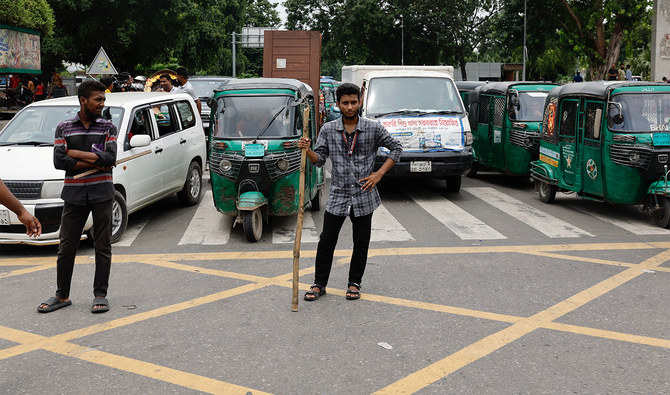DHAKA, Bangladesh: Bangaldesh’s president dissolved parliament Tuesday, clearing the way for new elections to replace the longtime prime minister who resigned and left the country after weeks of violent unrest.
President Mohammed Shahabuddin’s office announced the decision Tuesday afternoon. Earlier, a protest leader had threatened to return to the streets unless parliament was dissolved the same day.
Hasina resigned and fled the country by helicopter as protesters defied military curfew orders to march on the capital, before thousands of demonstrators stormed her official residence and other buildings associated with her party and family.
Her depature came after weeks of protests against a quota system for government jobs descended into deadly violence, fueling a broader challenge to her 15-year rule. The government attempted to quell demonstrations by shutting schools, imposing curfews and sending in troops to shoot tear gas, rubber bullets, and live ammunition, leading to some 300 deaths, but those heavy-handed tactics only drove further discontent.
Bangladesh’s figurehead president and its top military commander said late Monday that an interim government would be formed soon to preside over new elections.
Military chief Gen. Waker-uz-Zamam said Monday he was temporarily taking control of the country, as soldiers tried to stem unrest. The military wields significant political influence in Bangladesh, which has faced more than 20 coups or coup attempts since independence in 1971.
Mohammed Shahabuddin, the country’s figurehead president, said after meeting with Waker-uz-Zamam and opposition politicians that Parliament would be dissolved and a national government would be formed as soon as possible, leading to fresh elections.
Nobel Peace Prize laureate Muhammad Yunus, who could shepherd Bangladesh’s new interim government, is currently in Paris for the Olympics. He called Hasina’s resignation the country’s “second liberation day.” He could not immediately be reached for comment.
A longtime opponent of the ousted leader, he was accused of corruption by her government and tried on charges he said were motivated by vengance. He received the Nobel in 2006 for work pioneering microlending.
Student organizer Nahid Islam said the protesters would propose more names for the cabinet, and suggested that it would be difficult for those in power to ignore their wishes.
The streets of Dhaka appeared calmer Tuesday, with no reports of new violence.
Amid celebrations, student Juairia Karim said it was a historic day: “Today we are getting what we deserve,” she said. “Everyone is happy, everyone is cheerful.”
Jubilant protesters still thronged the ousted leader’s residence, some posing for selfies with the soldiers guarding the building where a day earlier angry protesters had looted furniture, paintings, flower pots and chickens.
But the country was still counting the toll of weeks of violent unrest that produced some of the country’s worst bloodshed since the 1971 war of independence. Many fear that Hasina’s departure could lead to even more instability in the densely populated South Asian nation, which is already dealing with crises from high unemployment to corruption to climate change.
Violence just before and after Hasina’s resignation left at least 109 people dead, including 14 police officers, and hundreds of others injured, according to media reports, which could not be independently confirmed.
Amid security concerns, the main airport in Dhaka, the capital, suspended operations for eight hours.
In the southwestern district of Satkhira, 596 prisoners and detainees escaped from a jail after an attack on the facility Monday evening, the United News of Bangladesh agency reported, as police stations and security officials were attacked across the country.
Police in Dhaka mostly left their stations and assembled in a central barracks in fear of attacks after several stations were torched or vandalized.
The main opposition Bangladesh Nationalist Party Tuesday urged people to exercise restraint in what it said was a “transitional moment on our democratic path.”
“It would defeat the spirit of the revolution that toppled the illegitimate and autocratic regime of Sheikh Hasina if people decide to take the law into their own hands without due process,” Tarique Rahman, the party’s acting chairman, wrote on the social media platform X.
In a statement Monday, the United Nation’s human rights chief, Volker Türk, said the transition of power in Bangladesh must be “in line with the country’s international obligations” and “inclusive and open to the meaningful participation of all Bangladeshis.”
Hasina landed at a military airfield near New Delhi on Monday after leaving Dhaka and met India’s National Security Adviser Ajit Doval, the Indian Express newspaper reported. The report said Hasina was taken to a safe house and is likely to travel to the United Kingdom.
The 76-year-old was elected for a fourth consecutive term in a January vote that was boycotted by her main opponents. Thousands of opposition members were jailed before the polls, and the US and the UK denounced the result as not credible, though the government defended it.






















